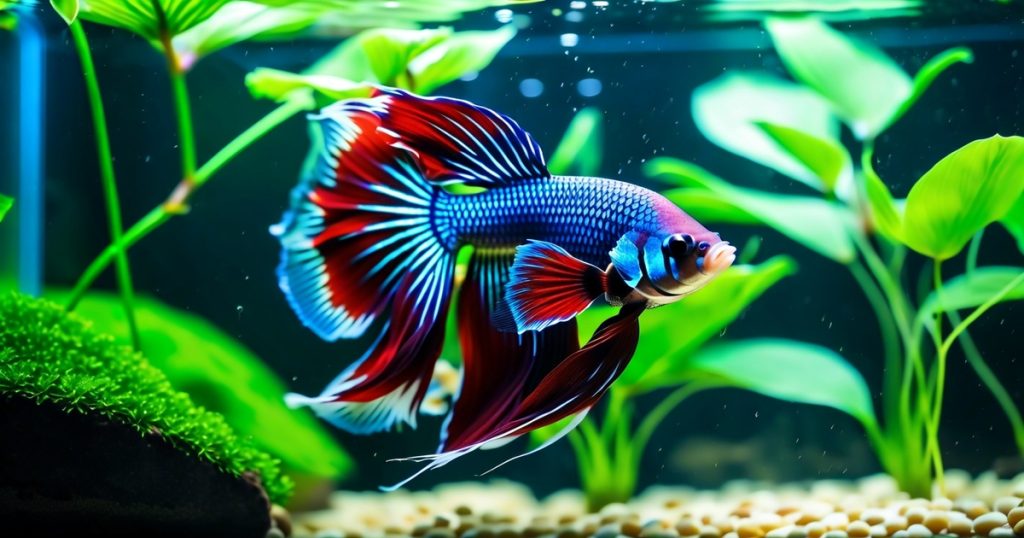Ever found yourself wondering why your betta fish suddenly vanished from its tank? It’s a perplexing situation that can leave any pet owner feeling puzzled and concerned. In this post, we’ll delve into the common reasons behind a betta fish’s disappearance, shedding light on potential causes such as illness, inadequate tank conditions, or even predatory tank mates.
By understanding these reasons, you can take proactive steps to ensure the well-being of your aquatic companion. Stay tuned for valuable insights on unraveling the mystery of your missing betta fish reasons.
Table of Contents
ToggleCommon Reasons for Betta Disappearance

Changes in Water Temperature
Betta fish are sensitive to changes in water temperature. If the tank’s temperature fluctuates too much, your betta may feel stressed and hide in a cave. For instance, sudden drops or rises in temperature can cause your betta to disappear from sight as they seek refuge in a cave.
Sometimes, a heater malfunction can lead to drastic changes in water temperature. This could stress out your betta fish and prompt them to retreat into hiding spots within the tank.
Overcrowding Stress
Another reason why your betta fish might vanish is overcrowding in the tank. When there are too many other fish or decorations taking up space, it can make your betta feel overwhelmed and anxious. As a result, they might retreat to secluded areas of the tank where they feel safe.
If you notice that there are too many objects or inhabitants inside the tank, consider rearranging or removing some of them to create more open space for your betta fish.
Illness or Old Age
In some cases, betta fish may disappear due to illness or old age. When feeling unwell or reaching their senior years, bettas tend to become less active and spend more time hiding away from view. It’s crucial to monitor their behavior closely during these times and ensure that their environment remains comfortable and suitable for their needs.
Remember that various factors could contribute to why your betta fish disappeared, so observing their behavior alongside maintaining proper care practices is essential for ensuring their well-being.
Investigating the Tank Environment for Clues
Checking for Openings and Gaps
Inspect the aquarium thoroughly to identify any small openings or gaps where your betta fish might have escaped. Look around plants, decorations, and rocks for potential hiding places or escape routes. Remember that bettas are skilled at finding even the tiniest spaces to squeeze through.
It’s essential to consider all possible areas within the tank where a betta could disappear. Sometimes, seemingly insignificant openings can lead to a betta sneaking out of its habitat without notice.
Monitoring Water Quality and Tank Decorations
Keep an eye out for any unusual changes in water quality or alterations in the tank environment that could have prompted your betta’s disappearance. Check if there are any dead tetra bodies inside the tank, as this may indicate issues with water parameters or aggressive behavior from other fish.
Examine decorative elements such as plant clumps and caves inside the aquarium. These spots often serve as hiding places for bettas when they feel stressed or threatened.
Remember that maintaining a stable and suitable environment is crucial for your pet’s well-being, so regularly assess any modifications in decoration arrangements or water conditions that may impact your betta fish.
Recognizing Signs of Illness or Stress in Betta Fish
Loss of Appetite and Unusual Swimming Patterns
Stress or illness can cause betta fish to exhibit changes in their behavior and eating habits. If your betta suddenly stops eating or swims erratically, these could be fishy signs that something is wrong. For example, if your once-active betta now hides at the bottom of the tank or near the surface for extended periods, it might indicate distress.
Keep an eye out for any odd swimming patterns, such as darting around frantically or struggling to stay upright. These fish stuff behaviors may signal underlying health issues that need attention.
Physical Symptoms to Watch For
When observing your betta fish, pay close attention to any physical symptoms that may indicate stress or illness. Look for discoloration on their body, especially patches of white spots which could be a sign of disease. Check for fin rot – a condition where the fins appear tattered and disintegrating – which indicates poor water quality.
Bloating is another concerning symptom; if you notice your betta’s abdomen becoming unusually large compared to its normal size, it might suggest an internal issue requiring prompt intervention.
Remember that these signs are not definitive proof of illness but should prompt further investigation into potential problems with your pet’s health.
Addressing Aggressive Behavior Among Tank Mates
Separate Aggressive Tank Mates
If you notice aggressive behavior among your betta’s tank mates, it’s crucial to take action. If possible, separate the aggressive fish from your betta. This can help reduce stress and prevent any further harm to your betta fish.
Introducing Hiding Spots To provide a safe space for your betta, consider adding hiding spots and plants in the tank. These will offer refuge for your betta when faced with aggression from other tank mates. Creating hiding places can help alleviate stress and make the environment more comfortable for your betta.
Relocating Your Betta If aggression persists despite separating the aggressive tank mate or introducing hiding spots, relocating your betta to a different tank may be necessary. This step can ensure that your betta is removed from a hostile environment and placed in a safer space where they won’t face continuous intimidation.
Ensuring Adequate Oxygen and Water Quality
Improving Oxygen Levels
To prevent your betta fish from disappearing, it’s crucial to ensure adequate oxygen levels in the tank. You can achieve this by installing an air pump or adjusting the water flow. This helps to keep the water well-oxygenated, creating a healthier environment for your betta fish.
Maintaining a clean tank is essential for optimal water quality. When debris accumulates at the bottom of the tank, it consumes oxygen and releases harmful substances into the water. Regular cleaning and removing any excess waste will help maintain suitable oxygen levels for your betta fish.
Monitoring Water Parameters
Regularly testing and maintaining appropriate pH and ammonia levels in the tank are vital aspects of ensuring good water quality. High ammonia levels can be toxic to betta fish, leading to stress or even death. By checking these parameters frequently, you can take corrective measures promptly if any issues arise.
Performing regular water changes is another effective way to uphold proper water conditions for your betta fish. This practice helps remove accumulated waste and replenishes essential minerals in the water, contributing to a healthy aquatic environment.
Safeguarding Against Potential Tank Predators
Remove Predatory Fish and Invertebrates
To safeguard your betta fish, it’s crucial to remove any predatory fish or invertebrates from its tank. Some fish, like tetras, may be small enough to coexist with a betta peacefully. However, if they are nippy or aggressive, they can pose a threat to the betta. Certain invertebrates such as shrimp might become snacks for the betta.
It’s essential to carefully consider the compatibility of different tank mates with your betta before introducing them into the same environment. By ensuring that only peaceful species share the tank with your betta, you can minimize the risk of predatory behavior.
Secure Tank Decorations and Lid
Another critical measure is to ensure that tank decorations do not pose a threat to your betta. Avoid adding items with sharp edges or small openings where a betta could get stuck or injured. Bettas are known as strong jumpers and may attempt to leap out of open tanks when feeling threatened.
Using a secure lid on the tank helps prevent other pets like cats or dogs from accessing it and potentially harming your betta fish. This is especially important if you have other animals in your home that might view the fish as prey or simply be curious about what’s inside the tank.
Preventive Measures to Keep Your Betta Safe
Suitable Tank Size
Adequate space and hiding spots are crucial for the well-being of your betta fish. A larger tank, ideally 5 gallons or more, provides ample room for your betta to swim and explore. Adding live or silk plants, caves, and other decorations offers hiding places, reducing stress.
To illustrate, a small tank can lead to territorial aggression as the betta feels confined. This can result in fin nipping or even physical harm. Conversely, a spacious environment promotes natural behavior and reduces the likelihood of injuries.
Maintaining stable water conditions is vital for the health of your betta. Sudden changes in temperature or pH levels can stress your fish and weaken its immune system. Regular water testing and gradual adjustments help ensure a stable aquatic environment.
For instance, fluctuations in ammonia or nitrite levels can be harmful to bettas. These changes may cause diseases such as fin rot or ich. By monitoring water parameters consistently, you can prevent these issues from arising.
Quarantine New Additions
Introducing new fish without proper quarantine procedures poses risks to your betta’s health. Before adding any new betta companions to the tank, it’s essential to isolate them in a separate quarantine tank for observation.
For example: Observing new additions helps identify potential diseases like parasitic infections before they spread to other fish in the main tank.
What to Do If Your Betta Fish Is Missing
Thorough Search
Carefully search around the tank and nearby areas before taking further action. Look under decorations, plants, or any hiding spots within the tank. Use a flashlight at night to look for any signs of movement in dark corners. Sometimes bettas can wedge themselves into small spaces.
If you have other pets, check if they might have caused harm to your betta fish. Cats or even smaller fish could potentially cause stress or harm to your betta.
Review Potential Causes
Review all potential causes of disappearance and take steps to address them. Check water parameters such as temperature, pH levels, and ammonia concentration in the tank. Ensure that there are no sudden changes that may have stressed out your betta fish.
Consider factors such as illness or old age which may lead to unusual behavior in bettas. Take note of any recent changes in behavior or appearance prior to its disappearance.
Closing Thoughts
You’ve now uncovered the potential reasons behind your betta fish’s disappearance and learned how to address each possibility. By understanding the complexities of your betta’s environment and behavior, you’re better equipped to ensure their safety and well-being. Remember, a healthy and thriving betta is a result of a carefully monitored tank environment, regular health checks, and proactive preventive measures. Keep a close eye on your betta, maintain a clean and suitable habitat, and be ready to take action if any issues arise. Your attentiveness will make all the difference in keeping your betta happy and secure.
Take the time to implement the insights gained from this guide, and observe how they positively impact your betta’s life. Your dedication to providing the best care for your betta will not only bring you joy but also create a safe haven for your aquatic friend. Keep learning, stay vigilant, and enjoy the rewarding experience of nurturing a thriving betta community.
